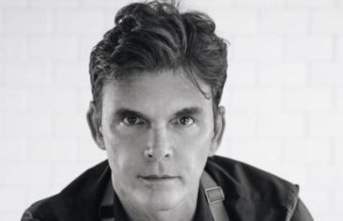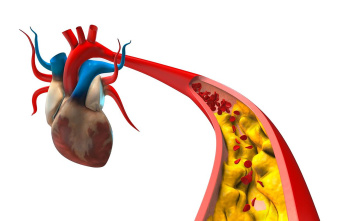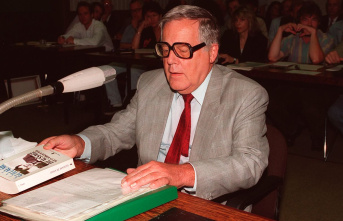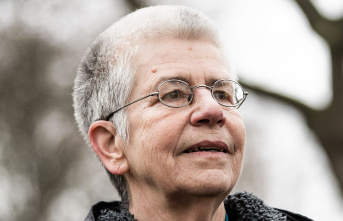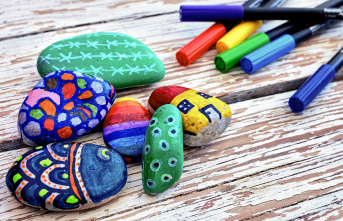Starting out from Vienna's Naschmarkt, Haya Molcho introduced the concept of modern Levantine cuisine to the world. For years, the Molchos have been surfing the wave of success with their family gastronomic concept. They now run twelve "NENI" restaurants, including in Vienna, Amsterdam, Copenhagen and Hamburg. There are also their own products and various cookbooks. The latest one just came out, it's called "Coming Home". Are the gastro high-flyers now settling down? The star met Haya Molcho and son Nuriel for an interview.
You describe yourself again and again as nomads, as world travelers. Now her new book is called "Coming Home". What does it mean to you to come home? Haya: Life, family, friends. It is a symbol of welcoming, being social, cooking together. After the Corona years, we all have the longing to spend time together again, to communicate. And of course "Coming Home" is also a family cookbook. Nuriel: In the cookbooks before, Haya realized herself as a cook with her dishes. Our big wish now was a book with dishes that we can also cook. We're all foodies in the family, but we're not all chefs. So back to the basics? Nuriel: Basics sounds wrong, the dishes are not bland. What is meant is feel-good food.
Family plays a big role for the Molchos, if not the biggest. With this book they give a completely new insight into their lives. Why? Haya: Our family is growing. There is now a daughter-in-law, Elior is engaged, Ilan has a girlfriend. There is nothing better than expanding the family. We always had an open house, the door is never locked. We are a living home. In Israel people are much more open and not as closed as the Europeans. That still has to change here.
NENI stands for Nuriel, Elior, Nadiv and Ilan, the four sons of Haya and Samy Molcho. The name also stands for the philosophy of the company. "For us and NENI, it's never just about the food. It's about the family, about feelings. That's what defines us," describes Haya Molcho.
And you are inviting us into this lively home with the new book? Nuriel: Exactly. To us as a family. We introduce ourselves. Each one of us is described by the others - because it's a cookbook as a spice or an ingredient.
Her father Samy is described in it as garlic, as a flavor carrier that rounds off every dish and at the same time is a perennial medicinal plant. You yourself were described by your brother as...Nuriel: ...Salad, yes. Salad is versatile, healthy and can be mixed together. I found myself in it. Haya: Nuriel's wife, Audrey, interviewed us for hours, digging deeper and deeper, really getting us to open up and really think about each other and what makes each individual special. Nuriel: In fact, the descriptions really do apply - to everyone.
They called "Coming Home" a family cookbook. Is it then at all one for people who don't know you and your story yet? Nuriel: Each of our books is not just a cookbook, it is always something more. In this we give the opportunity to get to know each other better. If you don't know us at all, you'll get a glimpse. Those who already know us can deepen what they know. But it remains a cookbook, it is not a biography. Haya: It's a different kind of cookbook. It was important to us that it was a bit more artistic and humorous. You can see that, for example, in the collages with the children's photos. Everyone's heart should rise when they leaf through it. The book is pure emotion. Actually a declaration of love to my family.
You, Haya, have the first chapter in the new book, then follow the four sons, then Samy. The parents are at the beginning and at the end like a parenthesis. It is striking that the order of the sons does not follow the typical NENI principle, i.e. Nuriel, Elior, Nadiv and Ilan. Why? Haya: Sorted according to the needs of the children, according to what they prefer to eat. Nuriel: We chose the dishes together. Each of us has thrown our favorites into the pot, which should definitely be there. With Elior, for example, it's a lot of soul food, with me it's more light cuisine. Haya: And Samy really wanted to have the traditional in it. We're not that religious, but we're very traditional.
This book feels a bit like a parting gift to the sons who have fled. Finally, congratulations, the first grandchild is coming soon. Nuriel: Thank you. Haya: Yes, that's certainly true. It's also about giving something away. Preserve the family's recipes so they don't get lost.
Home is, you say, eating together. You have a huge company now. That means a lot of travel, a lot of work. How often do you find time to eat with everyone? Nuriel: As often as possible. We try to make it possible several times a month. And with the baby I will be at home more and travel less.
What dish can the whole family agree on? Haya: Hummus! Everyone loves hummus. Nuriel: The most emotional dish in the book is definitely Samy's Mama's beans. Haya: This is a very important dish for us. We ate that together every Friday night for Shabbat... Nuriel: ...but hummus is the foundation that holds us together.
With NENI you have your finger on the pulse of the times. Levantine cuisine, you could say, brought into the mainstream. Your business grows and grows and grows. Hasn't the ceiling been reached at some point? Nuriel: No, on the contrary. So many people write to us that they think we're great. Whether we can't open a restaurant in Frankfurt or whether the concept would work well in New York.
In the subtext of the book one can read that there is also a longing for a quieter life. Is that correct? Haya: For me, the withdrawal is true. I am now 67 years old, my sons are still young. But: our common vision is a farm with a "farm to table" concept. The idea came up during the Corona lockdown when we all lived together under one roof again and realized how well it works. It would be like a kind of kibbutz, with animals and regenerative agriculture. Nuriel: But we're still growing. However, a rethink is taking place. Everyone used to want to be involved in everything. Now we're more concentrating on two or three things.
Aren't you afraid that the hype surrounding NENI will end at some point? Haya: We don't see ourselves as a chain or a sell-out, and I don't think we're perceived as such. We are a family that grows with our business. The most important thing is to stay authentic. We are within reach. If one of the chefs has a question, they can call me directly. And if someone wants to take a picture with me, I would never refuse. You mustn't get greedy. If you get greedy, that's the beginning of the end.
The eternal dilemma: What is still authentic and what is just an image? Haya: There are still people who don't believe that we are who we are. that this is real But that's their problem. Our philosophy is very important and so are our employees, because they transport it for us. The people in key positions travel with us and get to know us. All the cooks have just been with us in Vienna. This close contact is very important in order to maintain what we stand for.
And that would be? Haya: For us and NENI, it's never just about the food. It's about the family, about feelings. That's what makes us. Emotion also contains motion, i.e. movement. We want to move. Samy gave us a lot of that. Samy is open, very emotional. But no one who has to please everyone.


